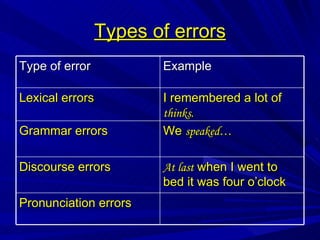Types of Errors can a Grammar Corrector Detect and Correct

Grammar correctors can detect and correct a wide range of errors in written text, including:
Spelling Errors: Grammar correctors can identify and correct misspelled words, typos, and words that are not recognized by the dictionary.
Grammar Errors: This includes errors related to grammar rules such as subject-verb agreement, verb tense consistency, pronoun usage, and parallelism.
Punctuation Mistakes: Grammar correctors can flag incorrect or missing punctuation marks, such as commas, periods, apostrophes, quotation marks, colons, and semicolons.
Capitalization Errors: They can detect instances where words are incorrectly capitalized or not capitalized when they should be, such as proper nouns or the first word of a sentence.
Sentence Structure: Grammar correctors can identify issues with sentence structure, such as run-on sentences, fragments, dangling modifiers, and misplaced or missing words.
Word Usage: They can suggest corrections for incorrect word usage, such as homophones (e.g., "their" vs. "there"), commonly confused words (e.g., "affect" vs. "effect"), and inappropriate word choices.
Style and Consistency: Grammar correctors can help maintain consistency in writing style, including suggestions for consistent spelling, punctuation style, and formatting.
Clarity and Readability: They can identify sentences that are unclear or awkwardly phrased and provide suggestions for improving clarity and readability.
Concordance Errors: This involves errors where parts of a sentence do not agree in terms of number, gender, or person, such as subject-verb agreement errors.
Redundancies and Wordiness: Grammar correctors can detect redundant phrases or wordy constructions and suggest more concise alternatives.
Overall, grammar correctors are designed to detect a wide range of errors in written text to help ensure accuracy, clarity, and professionalism in writing.
Thank you,